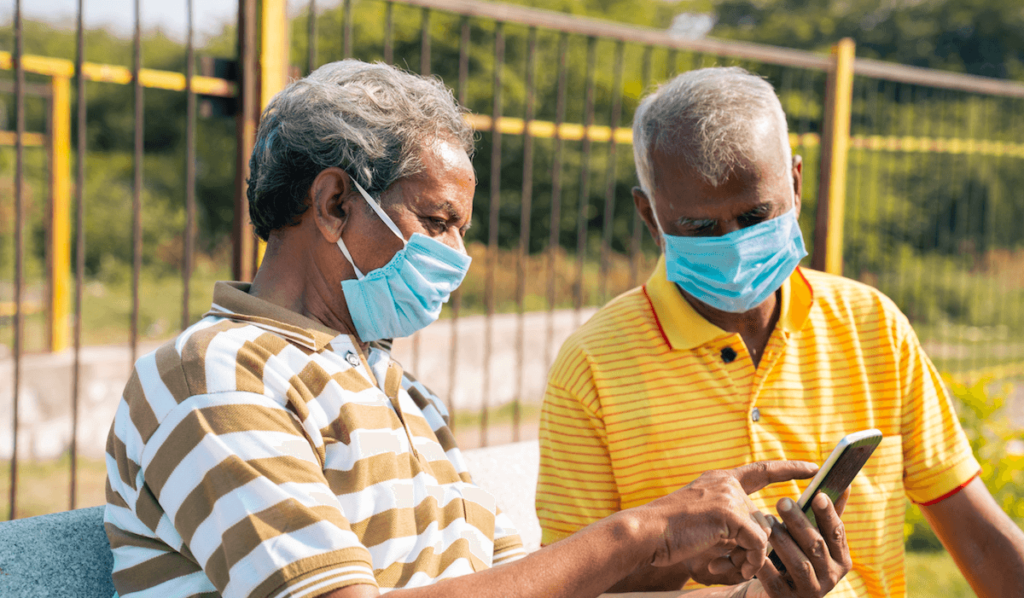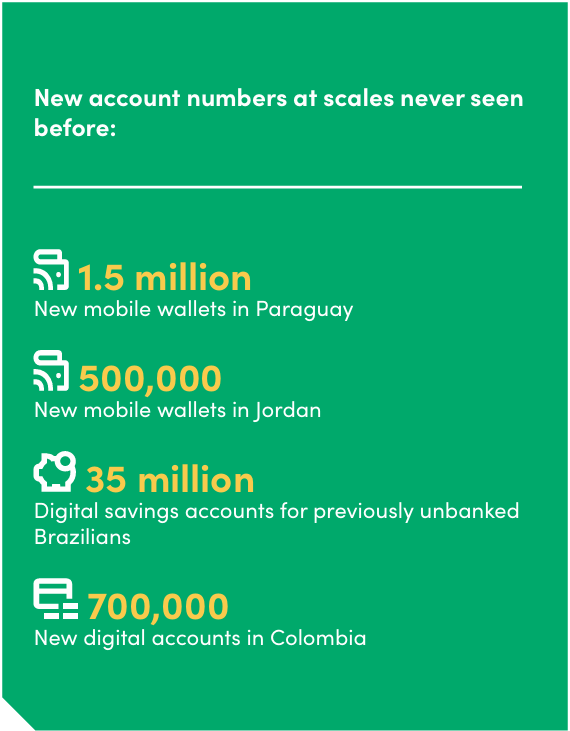

In the first quarter of 2020, when governments realized the extent to which COVID-19 had spread across the globe, they took unprecedented and rapid steps to slow its spread. The unintended yet inevitable consequence was that economic activity froze as in-person activities were shut down, and the impacts were particularly severe for people at lower income levels. Livelihoods vanished overnight, requiring economic relief for billions of people. By May 2021, the number of social assistance responses by governments worldwide had exploded to 1,841 as compared with 103 identified in March 2020, reaching more than 1.5 billion people. Many programs leveraged digital infrastructure to deliver funds quickly, without physical contact, and to reduce the risks associated with cash distribution. This massive relief effort required opening accounts for those not previously included, resulting in new account numbers at scales never seen before — 1.5 million new mobile wallets in Paraguay, 500,000 mobile wallets in Jordan, 35 million digital savings accounts for previously unbanked Brazilians (far more accounts were opened) and 700,000 new digital accounts in Colombia, to name a few.
Challenges of applying for relief end up harming vulnerable people, dampen public trust in such programs, and effectively reduce the intent of G2P protection schemes.
The rapid deployment of government to person (G2P) social protection payments because of COVID-19 demonstrated the extent to which these schemes increasingly rely upon a country’s digital financial ecosystem — from interoperable payments infrastructure to digital IDs, partnerships with commercial payment and financial service providers (and their agent networks), and collaboration with mobile network operators. When things went well, the payments were made seamlessly and helped ease the economic burden of the pandemic. But when things did not, it was consumers who bore the brunt. Many were unable to apply for relief because they lacked internet access, proper documents, or they had been a victim of identity theft. Long lines and illiquid cash out points, as well as hotlines jammed with calls and interminable wait times without resolution also posed challenges for those attempting to apply for relief. These challenges end up harming vulnerable people, dampen public trust in such programs, and effectively reduce the intent of G2P protection schemes.
Drawing on the lessons learned from the pandemic, governments, donors, and other humanitarian groups have an opportunity to improve delivery and reduce consumer risks in future G2P program design and rollout. End-to-end program design, clear accountability across multiple service providers, and consumer-friendly redressal systems are critical elements of successful G2P systems. And given how inextricably linked future G2P programs will likely be with their countries’ digital financial services ecosystem, such improvements might also have positive effects for consumers beyond those receiving government payments. There are also important considerations around data governance that governments need to start addressing sooner rather than later.
End-to-end program design, clear accountability across multiple service providers, and consumer-friendly redressal systems are critical elements of successful G2P systems.
This report is the fourth in a series of notes looking at how economic policies enacted around COVID-19 in emerging markets and developing economies (EMDEs) have impacted low-income users and the financial service providers that serve them. It is a companion piece to CFI’s December 2020 report Rapid Response for Social Payments During COVID-19, which maps out ways governments enabled rapid payments to those without existing accounts. The findings in this note come from literature review as well as key informant interviews conducted between June and September 2021. This research focused on uncovering consumer risks arising from the rapidly digitizing G2P programs aimed at the most vulnerable in society, most of whom have no prior experience with digital technology or the formal financial system. The literature review examined policy and research that captured the implementation of rapidly digitalized social protection programs, with a focus on the recipient experience. Given the recent (and even ongoing) nature of many of the programs, the literature review included less-formal sources including industry webinars. The team also conducted 20 key informant interviews with a range of stakeholders including experts in global social protection, consumer protection, and payments, as well as market actors such as governments, consumer organizations, and industry bodies in India, Nigeria, Ghana, Pakistan, Bangladesh, the Philippines, Colombia, and Brazil.










